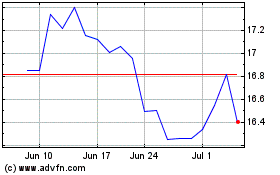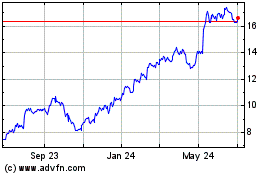Whistleblower Challenges SEC Over Delay on Award Decision
April 30 2019 - 8:28PM
Dow Jones News
By Kristin Broughton
A purported whistleblower in a foreign corruption case against
Teva Pharmaceutical Industries Ltd. says the U.S. Securities and
Exchange Commission has taken too long to determine whether to
grant a reward. He is now asking a federal court to weigh in.
The unidentified tipster filed a petition Monday asking the U.S.
Court of Appeals for the D.C. Circuit to compel the regulator to
make a preliminary decision within 60 days.
The petition comes two years after the tipster applied for
compensation from the SEC, according to the petition. Lawyers for
the whistleblower say two years is unreasonable.
The SEC, which isn't required to act under a certain time frame,
declined to comment.
Tipsters have grown frustrated with the length of time it has
taken the regulator to make determinations on such awards, which
can amount to several million dollars for big cases.
Between 2014 and 2017, the SEC took an average of more than two
years to decide if a whistleblower deserved a reward, according to
an analysis by The Wall Street Journal. That is more than twice as
long as in 2012 and 2013, the early years of the whistleblower
program.
The decision-making process has taken longer as the agency has
sorted through a flood of requests for awards and tips on potential
corporate wrongdoing. The SEC last year received 5,282
whistleblower tips, an increase of 18% from a year earlier, and
nearly twice the number received in 2012, the first full year after
the program took effect, according to an SEC report to
Congress.
Whistleblowers are entitled under law to between 10% and 30% of
the monetary penalties paid by companies in cases where their
information led to an enforcement action.
Teva in 2016 agreed to pay $519 million to settle charges that
it violated foreign bribery laws in countries including Mexico,
Ukraine and Russia. A Teva spokeswoman didn't respond to a call
seeking comment.
The tactic of suing the SEC in an effort to force a decision
isn't without precedent. In 2015, a similar lawsuit argued that the
SEC had taken an unreasonable amount of time to come to a decision.
The case was thrown out less than 60 days later because the agency
had made a determination on whether to offer a reward.
Suing the SEC might not always be the best strategy, according
to Sean McKessy, a lawyer at Phillips & Cohen LLP, who
previously served as chief of the SEC's whistleblower office.
The agency often faces factors outside of its control that can
delay the decisions it makes on awards, Mr. McKessy said. In some
cases, the SEC has to make a determination on several applications
for a single award, he said.
Whistleblower attorneys would be wise to take that into
consideration as they await a decision, Mr. McKessy said. If not,
they run the risk of burning bridges at the SEC.
"If you're going to blow up a relationship when you know you're
going to need some help from that entity in the future, it doesn't
make sense to me," he said.
--Dave Michaels contributed to this article.
Write to Kristin Broughton at Kristin.Broughton@wsj.com
(END) Dow Jones Newswires
April 30, 2019 20:13 ET (00:13 GMT)
Copyright (c) 2019 Dow Jones & Company, Inc.
Teva Pharmaceutical Indu... (NYSE:TEVA)
Historical Stock Chart
From Aug 2024 to Sep 2024

Teva Pharmaceutical Indu... (NYSE:TEVA)
Historical Stock Chart
From Sep 2023 to Sep 2024
